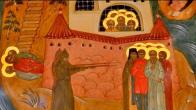You are here
St. Paulinus the Merciful, bishop of Nola (+431)
23 January/5 February
By his 20s, this man, a son of a senator, a wealthy, gifted person with an outstanding education was already elected a senator, and then consul and governor of the Italian Province of Campania. At the age of 25, he turned to Christ and was baptized - or as those around him phrased it, he "was led astray". That became the point of demarcation - where Roman Senator Pontius Meronius Paulinus ended, and Paulinus the Merciful began.
Paulinus' wife Therasia was his faithful companion and assistant. Their only son died a few days after his birth. After that happened, the young couple sold their possessions, distributed the money to the poor, and, seeking after a life of solitude, went to Spain and accepted monastic tonsure.
People's concept of "prestige" has changed little since those days. Therefore, it is quite easy to imagine the confusion of the Roman elite: Their successful brother had voluntarily resigned his position and given up his wealthy status, and was living in poverty in some remote, distant place, in far-off Spanish Bartsinona (now Barcelona). It was there that Paulinus' former tutor Ausonius dispatched a letter composed with a measure of sarcasm.
St. Paulinus soon became a priest. He and Therasia fed the poor, and took in orphans and cared for them as if they were their own children. Some time later, Paulinus and Therasia returned to the town of Nola, in their native Campania. The love the flock had for St. Paulinus was so great that they asked him to accept the dignity of Bishop of Nola. All the while, his life of poverty did not change.
St. Gregory the Great tells the following story about Paulinus the Merciful. In 409, Italy was attacked by a wild African tribe of Vandals, and many residents of Campania were forced into slavery. Blessed Paulinus would use everything he had in the episcopate, to ransom prisoners of war and to help victims of the enemy onslaught. After all of his resources were exhausted, a certain poor widow came to him, pleading for help. Her only son had been imprisoned, and she had nothing with which to ransom him. The Holy Hierarch said to her, "I have nothing but myself. Sell me, and ransom your son. Or trade me into slavery for him."
On hearing this from her bishop, the old woman thought he was making fun of her. However, the wise and oratorically gifted bishop was able to convince her that he was serious, and together they went off to Africa, to see the prince by whom the widow's son was enslaved.
Upon arriving at the prince's home, they stopped at the gates to wait for the master. When the prince came out, the widow fell to her knees before him, and tearfully pleaded for her son's release. She said, "Here, I give you this man in exchange for my son. Only release my son to me, for he is my only son."
The prince, attentively examining St. Paulinus, asked him, "What trade do you know?"
He responded that he was good at tending gardens. The prince, who was in need of a gardener, gave the widow back her son, and the mother and son returned home, while St. Paulinus remained. The Vandal king soon recognized the gardener's noble birth and his wisdom, and would often converse with him.
It happened that the gardener said to his lord, "Very soon your king will die. Before that happens, you need to consider what to do, and how to manage the kingdom." The prince whom the Saint served was the Vandal king's son-in-law. As a loyal citizen, he hurried to tell everything to the king. The king wanted to see this gardener-seer for himself, and it was decided that Paulinus would be sent to bring fresh vegetables to the royal palace. So it was done. On seeing Paulinus, the king turned pale, and calling his son-in-law, confessed, "Last night I dreamed that I was being judged, and in the courtroom one of the accusers was this man. After the conviction, they took away from me the flail of office that had been entrusted to me. Surely, your gardener is no ordinary man; he needs to be more closely questioned as to who he really is."
After the bishop was forced to identify himself, they offered that he take whatever he wanted, and return to his homeland. St. Paulinus asked but one thing: that all of the prisoners taken in Campania be released with him. His wish was granted, and he and his entire flock were sent by ships heavily laden with grain, to their homeland. Several days later, the Vandal king died, and, as St. Gregory writes, "the flail of office entrusted to him…was passed from him to another."
Through his charity and compassion for the poor, Paulinus garnered the love not only of the local Christians, but also of the pagans and the Jews. Thanks to the love shown by all peoples, many traditions having to do with St. Paulinus' life and struggles have coalesced. For example, according to one of them, Paulinus, Bishop of Nola, was the first to use bells in Divine Services. Once, exhausted, he lay down to sleep in a certain field in bloom, but soon was awakened by the melodious ringing of little bells being carried by angels. This inspired the Holy Hierarch to employ in Divine Services the already existing means of signaling, but in the form of the bluebell flower.
In addition to traditions and recollections about Paulinus the Merciful, we have had passed down to us his literary works, hymns and letters - including his response to his former tutor Ausonius' questions and criticisms.
Those who have come to love Christ, who have left behind their ordinary milieu, are familiar with mocking inquiries by former friends, with invitations to come in and "sit as we had before, and in overall to drop these eccentricities...". It is often very difficult to find the words needed to answer honestly without offending the [inquirer]. For St. Paulinus, it was even more difficult, for the one mocking him and calling for him to return was his teacher, to whom he owed a great deal.
The pupil's response to the one who "had raised, elevated, and taught [him] word and letter," is quite resolute: a Christian must not give himself over to "insignificant matters and absurd compositions." Yet, this is not a rebuke, but an honest attempt at explanation, an attempt to impart to his teacher the sense that the One True God, the Creator of the Universe, calls us to "change [our] life and leave behind our former ways."
The Saint demonstrated his respect for his instructor by the fact that his reply was in verse, and conformed to all of the rules of rhetoric and poetic art that had been taught him by Ausonius. Paulinus simply employed all of this art in a hymn to the Savior.
The entire letter is a remarkable combination of love with honest, sincere disagreement, humility before his former teacher, and a zealous preaching of Christ. Faith, talent, love, impassioned nature, and yet again, love: this is the bouquet of which the reply to Ausonius was comprised.
St. Paulinus' relics are in the Church of the Holy Apostle Bartholomew in Rome.
From St. Paulinus' reply to Ausonius:
I both believe and fear
and in the time allotted to me ere I die,
I rush to seek redemption of my sins.
And in anticipation of [my death],
my heart, filled with total faith, yet quakes,
and my soul awaits in terror what is to come.
What if in frivolous cares it gets bogged down in
and stays bound to the body when
the heavens open and the trumpet sounds,
and it cannot rise.
On light wings flying off to meet the King...
I have entrusted to the age to come
all that I have -
and with a peaceful conscience
now await my death
If satisfied, salute your friend with hope abundant,
And if not - leave to Christ approval of it all.
Address of our Cathedral
Subscribe to our mailing list
While all the materials on this site are copyrighted, you may use them freely as long as you treat them
with respect and provide attribution on the Russian Orthodox Cathedral of St.John the Baptist of Washington DC.









